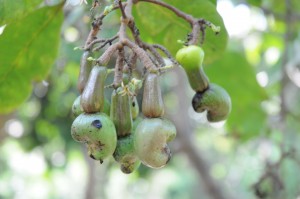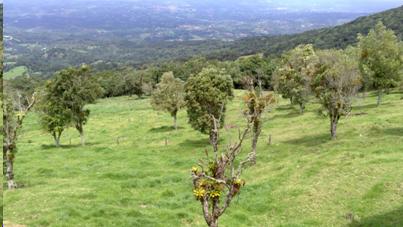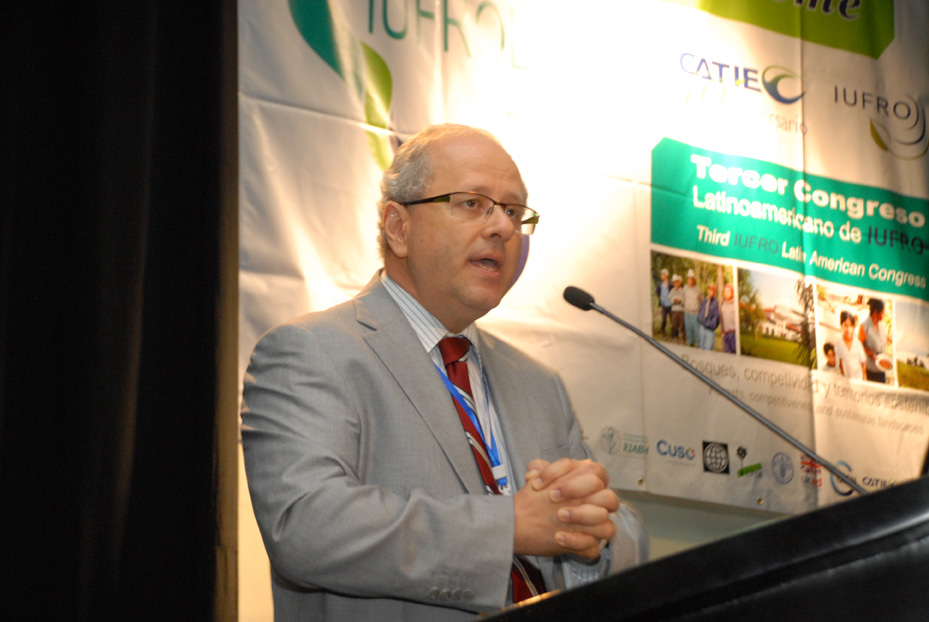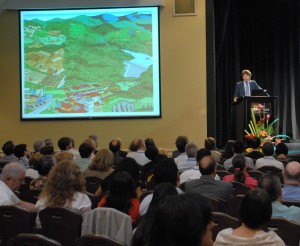Meet the Coordinator
Meet the Coordinator
Interview with Division 6 Deputy Division Coordinator Taylor Stein
From: Division 6 Newsletter, Issue 02, 01-2021
https://www.iufro.org/fileadmin/material/science/divisions/div6/60000/iufro-division-6-newsletter-issue-2-2021-01.pdf
What’s your name and affiliation, and what’s your role in Division 6?
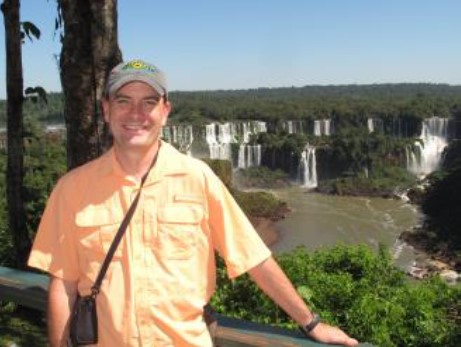
My name is Taylor Stein, and I am a professor of ecotourism and natural resources management in the School of Forest, Fisheries, and Geomatics Sciences at the University of Florida in the US. I happily serve as a deputy for IUFRO in a few areas. I am one of three Deputy Coordinators for Division 6, overall, but I also happily serve as Deputy Coordinator for Working Group 6.03, Nature Tourism, where I had previously served as Coordinator.
Read more…Spotlight #80 – Becoming visible – non-timber forest products and a sustainable economy
Spotlight #80 – Becoming visible – non-timber forest products and a sustainable economy

One positive and largely overlooked outcome of the current coronavirus could be a stronger bioeconomy.
“I think the pandemic is going to spur the bioeconomy,” said Dr. James Chamberlain of the United States Forest Service, Southern Research Station in Blacksburg, Virginia, and Coordinator of IUFRO’s Unlocking the Bioeconomy and Non-Timber Forest Products Task Force.
Read more…Forest Restoration: enabling environment and mobilizing stakeholder’s support in Guatemala
With the Archaeological Park and Ruins of Quirigua, a protected UNESCO World Heritage Site, and its national tree, Ceiba sp., the fifth blog post is in Guatemala. The name of the project is Chimaltenango Restoration Initiative, in Guatemala, Central Highlands.
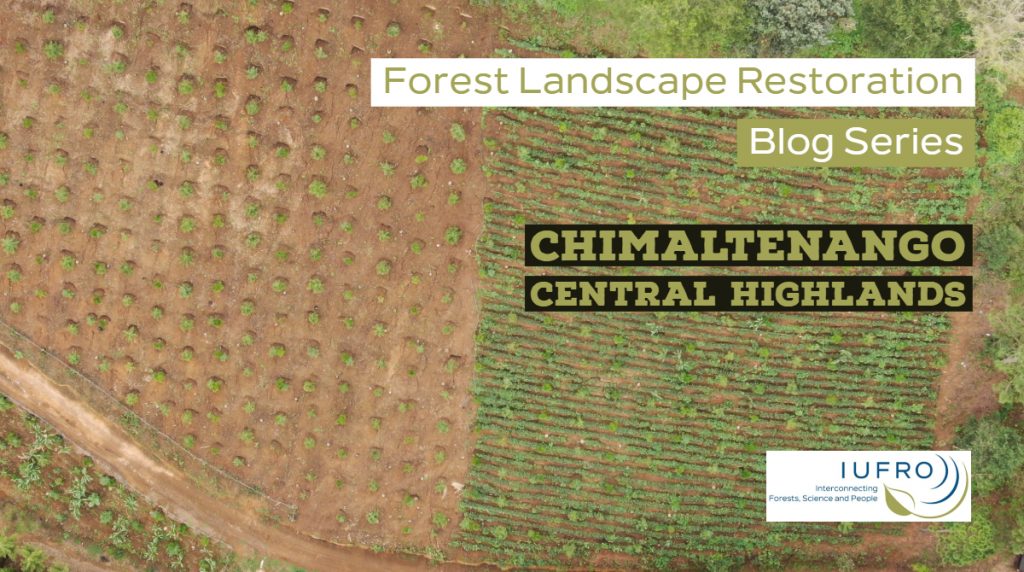
Spotlight #63 – What’s in the future for Non-Timber Forest Products?
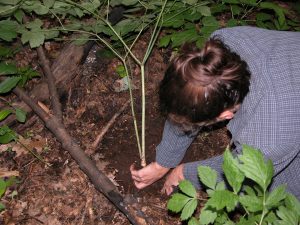
The roots of many forest plants are harvested for their medicinal values. Changes in climate and lack of management may imperil their long-term sustainability and the people who depend on them. Photo credit: James Chamberlain, USDA Forest Service.
The Forest Service of the U.S. Department of Agriculture has recently published “…the most comprehensive assessment covering the production and management of non-timber forest products (NTFPs) and resources – as well as the cultural, social, economic, and policy dynamics that affect them.” The assessment covers every state in the U.S.
But the findings can be utilized far beyond the U.S. borders. Read more…
Research and Development for Sustainable Forest in Asia
Keynote Presentation by Don Koo Lee, Seoul National University, Korea, Tuesday 25 Oct 2016
This most inspiring talk about the important roles of trees, soil and forests for human life highlighted ways of how to achieve sustainable development and showcased success stories, especially the historic achievement of reforesting Korea.
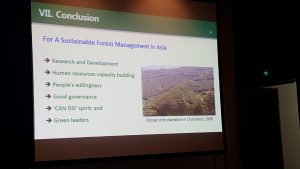
Professor Don Koo Lee speaking about sustainable forest management in Asia. Photo: Gerda Wolfrum, IUFRO Headquarters.
The goods and services provided by forests are manifold and indispensable for people and the environment. Forests are crucial, among other things, for stabilizing soil, providing water resources, supporting biodiversity, protecting against natural hazards, delivering timber and non-timber products, and, quite importantly, combatting climate change. In order to ensure that future generations will be able to enjoy the same benefits from forests, sustainability is indispensable in the management and use of natural resources. Read more…
Spotlight #30 – Forests: Food for thought – and nourishment
Forests: Food for thought – and nourishment
A report that analyses the complicated, intertwined and often oppositional philosophies, land uses and governance regimes that comprise the forest-food nexus, will help inform deliberations as the United Nations Forum on Forests develops a 15-year roadmap for international forest policy.
At the heart of the new report is the understanding that forests and trees cannot, by themselves, replace the role of agriculture, but they are critically important to food security and nutrition.
How to improve the institutional setting for sustainable landscapes?
Beyond natural conditions it is the institutional setting that determines how landscapes are used. The institutional setting encompasses governance frameworks at multiple political levels including a multitude of public, private and societal actors.
However, after years of recognizing the need for coordinated multilevel governance, we have failed. To move forward, we need to think about why we have failed and, from there, develop a new architecture consistent with this explanation.
Obviously, complex multilevel governance of landscapes brings an increasing diversity of actors with different values to the table, with the intersection of state and private, global to local, across multiple sectors each focused on different problems and policy instrument preferences, creating challenges for coordination within the systems of power that result.
IUFROLAT III Session Highlights: International Forest Governance
International forest governance and its influence on the convergence of forest policy in Latin America
For more information on the IUFRO Task Force on International Forest Governance, visit: http://www.iufro.org/science/task-forces/intl-forest-governance/
Globally, great strides have been made in the last 20 years as to what constitutes responsible forest governance. Yet, frustrations exist at the scale and pace of change. In Latin America, there continues to be a notable gap between ‘rules on paper’ and ‘rules in use’ in most countries, and governance tends to remain firmly based in ‘command-and-control’ approaches established decades ago.
In the session entitled “International Forest Governance and its influence on the convergence of forest policy in Latin America”, leading scholars in this field discussed what political science can do to improve international forest governance in the region through a mix of existing and emerging environmental policy instruments.
Reported cases of “carbon cowboys” deriving indigenous communities from intended benefits from REDD+ have created mistrust and infighting and have raised questions about the usefulness of market-based approaches to environmental problems such as climate change. Yet, the political scientists concluded that – if well designed – market-based instruments such as forest certification or payments for environmental services can help deliver effective policy outcomes. Costa Rica can be cited as a positive example on how new forms and modes of governance have successfully been incorporate into forest policy.
The session also discussed the newly emerging discourse on “rights of nature” in which nature is treated as a ‘subject’ rather than an ‘object’ in environmental legislation. While the notion of collective property rights reflected in this new approach can be seen as a more ethical approach to natural resources, it may however also be motivated by more mundane considerations, such as the intention to bargain for increased financial support from the international community.
Overall, the examples presented in the session indicated the need to incorporate new forms and modes of governance into forest and environmental policy in Latin America. If well-designed, instruments such as legality verification can help form large coalitions of actors and can trigger a “ratchet up” towards better forestry standards in the region.
Presentations in this session:
Policies for promoting sustainable forest management: Convergence of domestic policies and instrument mixes across Latin America (Kathleen McGinley, International Institute of Tropical Forestry, USA)
Carbon cowboys: case studies from Peru (Wil De Jong, Kyoto University Japan)
International forest governance and the rights of nature discourse in South America (David Humphries, UK)
Adaptation of tropical forest management in climate change (Rod Keenan, University of Melbourne, Australia)
Agroforestal systems as an alternative to coca crops in the Chapare region of Bolivia (Eduardo Lopez Rosse, UMSS, Department of Natural Resources, Bolivia)
Factors driving botanical tree diversity in agroforestry systems in Central America (Jenny Ordonez)
IUFROLAT III Keynote Address by Eduardo Mansur, FAO
Challenges and Opportunities for Sustainable Forest Management in a Changing Context
Wednesday, 12 June 2013
The first keynote speaker at IUFROLAT III was Eduardo Mansur, Director of FAO’s Forest Assessment, Management and Conservations Division. He talked about “Challenges and Opportunities for Sustainable Forest Management in a Changing Context”.
First, however, he conveyed greetings from Eduardo Rojas Briales, Assistant Director-General and Head of the Forestry Department, Food and Agriculture Organization of the United Nations, on whose behalf he was giving this presentation.
Mansur started by asking what the world should be like in 2050, when the world’s population is estimated to have exceeded 9 billion people.
Pressure on natural resources and the need for food will have increased tremendously by that time. He identified the following major challenges:
1) Food
2) Energy
3) Climate Change
In order to respond adequately to these, which are in fact closely interrelated, he explained various necessary approaches such as the landscape approach. He also underlined the big potential of restoration for improving the environmental situation without affecting food security.
In view of these challenges, the main objectives of FAO are:
1) Eradication of hunger
2) Elimination of poverty and strengthening of economic and social progress
3) Sustainable management of natural resources
Part of the response to these challenges is better governance of resources and more social participation. Integration and inter-sectorial approaches are key here. This is also especially true for forest research, which needs a more integrated approach.
Mansur explained concepts and tools that FAO has worked with so far and will continue to use in the future, such as the concept of sustainability, the forest resources assessment (FRA), criteria and indicators, etc.
In conclusion, he identified communication and social networks as a key tool to change people’s often blurred conceptions especially with regard to forest management. Science and research are essential here as they can provide the data and knowledge which will help to do away with erroneous perceptions and trade-offs between biodiversity and forest use, for example.
IUFROLAT Inaugural Address: Climate Smart Territories
Jose J Campos, Director General, CATIE, took centre stage once again giving an inspiring presentation entitled, “Climate smart territories- fostering production, resilience and reduced emissions through socially inclusive land management.” He opened by saying that it is important to think and to work on the territorial level. We should strive to optimize the goods and services in a territory, and to craft a vision with the different players in a territory. It is possible to diversify the economy and recover forest coverage, and noted that countries such as South Korea, and Finland are already doing so.
He stressed what is needed is collective actions from stakeholders; to give a positive result in a territory and ensure that we can improve our landscapes. He noted that this will take indigenous knowledge, new technologies, increased research and time, and it is important not to be spontaneous in how we approach the problems.
Key messages from his presentation include:
- Global challenges increasingly threaten human security; climate, food, water, energy, etc.
- System approaches (livelihoods, territorial, sustainable production and value chains) could effectively manage synergies and trade-offs among global challenges.
- There is a need for collective action through effective local governance and co-management of natural resources.
- “Climate smart technologies” are a tool that links top=down and bottom-up actions for collective impact.
He continued to explain that we do not need to reinvent the wheel. We need to find territories and existing projects to use as a model. He finished by saying that the key to this is in future professionals and in new interdisciplinary science. He stated there is a need to link students to ongoing development initiatives through fieldwork and case studies, to link their education to research, to local development processes and their contributions to society. If we work together we can create a virtuous circle for inclusive and sustainable human well-being.

